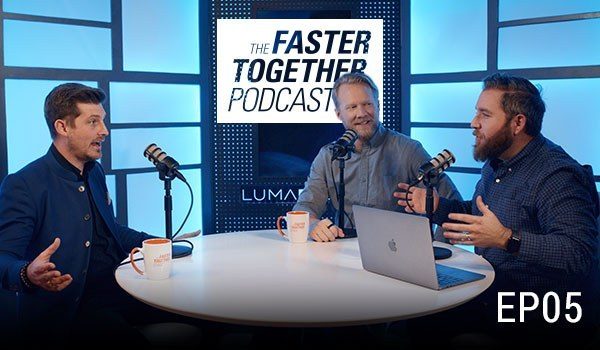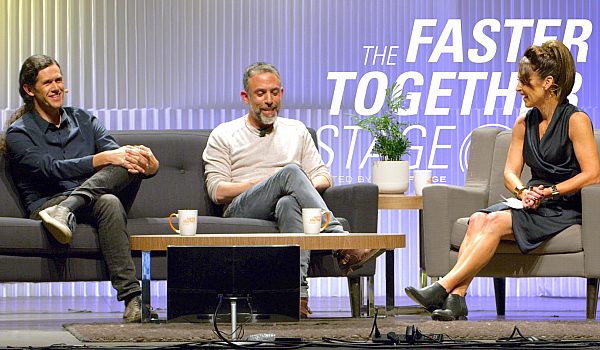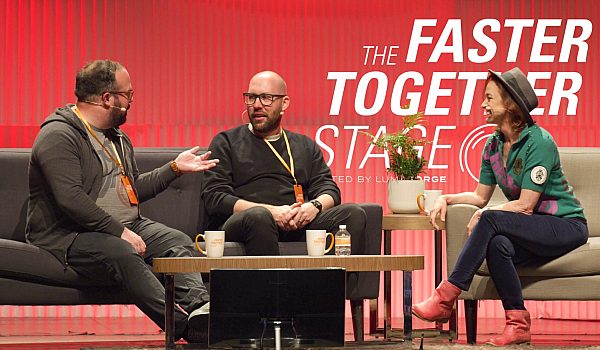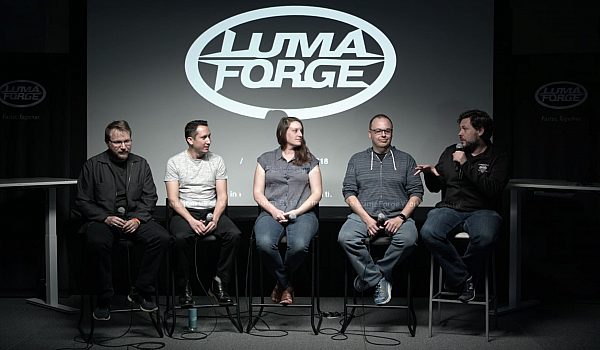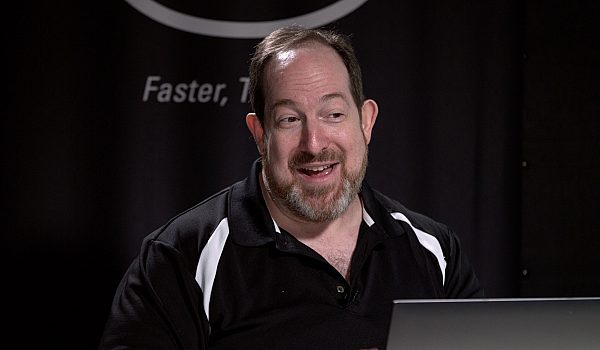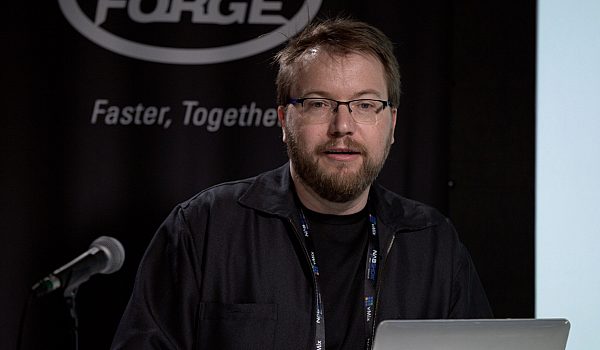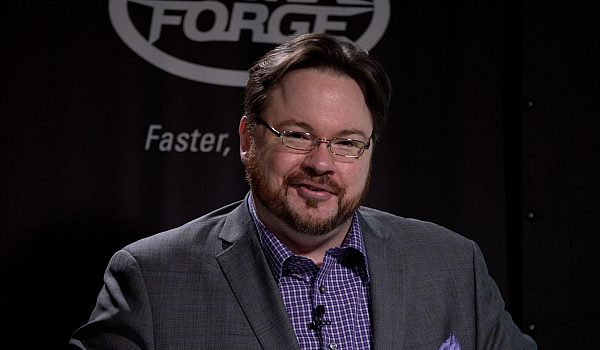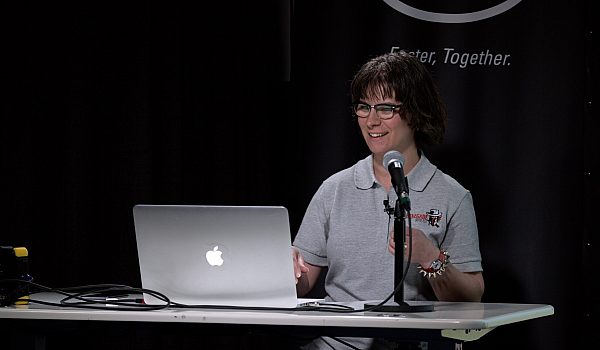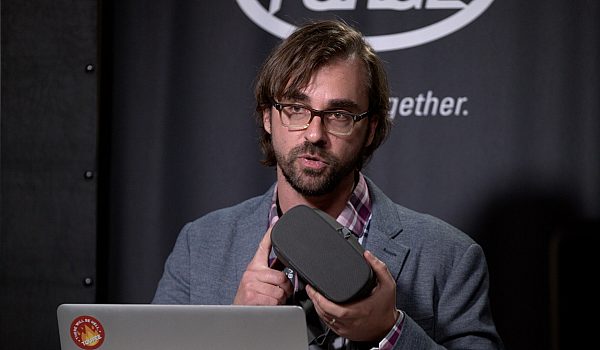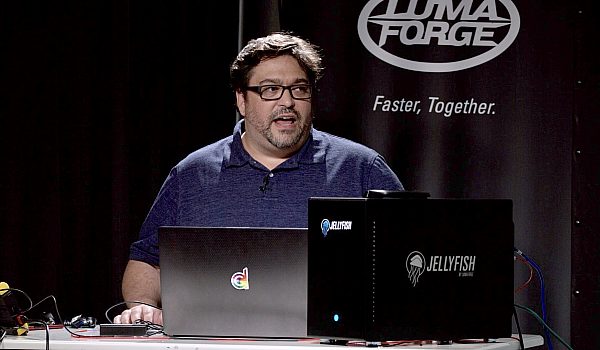Josh Beal is a Hollywood editor who has work on such shows as Counterpart, Bloodline, and House of Cards. As a TV editor, Josh thinks it is time for Hollywood to reconsider Final Cut Pro X as a viable editing platform.
In this presentation, Josh explains why Avid Media Composer is the King of the NLE in Hollywood and what needs to happen to convince current Media Composer editors to switch over to Final Cut Pro X.
- Hello, hello. First of all, before I get goin' I just wanna say thank you to Patrick Southern and the gang at LumaForge for inviting me out here. It's really, it's really good to be here. I promised myself I'd never come back to Las Vegas, and the fact that I'm standing here right now is a testament to how excited I am by a lot of the thinking coming out of this community. There are few things that could get me here. I don't really have a demo to show you exactly today. I just was gonna talk a little about Final Cut 10 and why I think it's important, in my view, and where it kinda currently fits or doesn't into Hollywood cutting rooms, and specifically scripted TV dramas, which is the world that I work in. These are some of the credits. Just a disclaimer for the sake of this talk. When I say editors I'm gonna mean my immediate peers. There are lot of different editors out there, but I'm gonna be talking about people who worked in scripted TV series or features produced by studios in the United States, because that does make a difference.
I think Final Cut's a little more widely used outside of this country. I'm not a Hollywood heavyweight, right? I'm a long, long way from a Walter Murch. But I am a working TV editor, and there are painfully few of us out there who seem interested in exploring and advocating for new tools like Final Cut. And I would love to see that change, both for selfish reasons and also because I genuinely think Final Cut is a unique tool that has a lot to officer, but, unfortunately, despite a few exceptions, Hollywood's view of Final Cut is more or less frozen in time. Specifically, I would say it is stuck somewhere around April 12th, 2011, which is when I think it came out. That's kinda where my peers see it. For a variety of reasons, they remain largely apathetic to it. Because I work in the Hollywood system, that means I use Avid Media Composer primarily. It is the unquestioned king there, as most of you probably know. If another platform's gonna come along and make a play for editors' attention in Hollywood, Avid's the one to beat. I think it's important to acknowledge that Avid holds this king title for a variety of very good reasons. I think a lot of people in the Final Cut community might sort of look at Avid as an archaic player in the NLE game these days, and there's some truth there, but the fact remains it's an insanely capable system. The argument for its continued dominance in Hollywood is a really good one. I just think it's an argument that is important to challenge and one that I think is beginning to erode.
Despite the welcome announcements and developments that Avid continues to make, I'm just not convinced it's actually gonna turn out to be a platform built for the future. Anyone remember this one? I saw it in the theater and it was the first one cut on Avid, I think, and if we think about where technology was at in 1993, that's the near Apple shipped its first Newton and the PowerBook Duo was kinda the height of portable computing. And just to stick the knife in and twist it a little further, for any 40-somethings out there, that is also the year Ariana Grande was born. Found that out through my Googling. At it's core, Avid hasn't really changed. To say it hasn't evolved and totally improved over the years, that's not remotely true, 'cause it has quite a bit. It's just that the underlying metaphor for its use remains the same. This is something that could be said for all the other NLEs out there these days. All of them, of course, except one. Final Cut just kinda has rethought the problem. And so, as a creative professional, I want the tools I use to improve beyond incremental little tweaks to a long-existing tool set. I think after 25 years, we're due to rethink our metaphors. And Apple is seemingly the only company with the resources or the willingness to do that. Now most of my peers are perfectly happy with Avid. They're really fast on it.
We've worked on it for decades and we know what to do with it. We don't have to think about it. And critically, we know it's a system that isn't gonna buckle under the demands we'll be putting on it. So, why the hell am I talking about metaphors and why would an editor be interested in using any other tool? It's not fun learning new software lots of times, and moreover, we don't have the time. Or at least we feel we don't. I love this quote, just read it yesterday in an Art of the Cut episode. Benjamin Mercer is a feature editor in Europe who just cut a huge film in Finland, in case you haven't read about it already. So the short answer to the question of why, is that working in Final Cut's faster. And that's a common enough refrain that you hear from a lot of people, but to really understand what makes it faster and why I think that's important, we kinda have to think about what editors do in the first place. Then kinda look at what Final Cut is doing in that space. I think it's really interesting, because I don't think faster is always about hitting deadlines or going home earlier, nice as that can be. I think more importantly it can positively affect the process of creating in and of itself.
As editors, we're storytellers, but we typically aren't telling our own stories, and in the end we're facilitating and helping someone else's ideas come to fruition. We're like sorta the mediums between a creative idea and the materialization of that idea on screen. It has to travel this distance from wherever it originates, be the show runner or whoever, through your brain, through your NLE, before it becomes something tangible. Anything that can tighten this distance, even a little, I think is to be embraced. This principle isn't new, right? It's probably been in play ever since people have been collaborating with each other, because the majority of this process, of course, has nothing to do with the software we use. A good editor is hired precisely because as a personality they're able to already minimize this gap. They can understand their collaborators' intent. They can understand the intent of the material and of the story. They can translate those ideas into effective moments on the screen. So a good editor can demonstrate their value regardless of what they're cutting on, but the tools they use do matter, I would argue. And they do have a degree of influence on this translation process, and if they didn't, we'd probably still be cutting with scissors and tape. Imagine if it were possible to edit an episode of TV or a feature film with no consideration for technical questions.
No need to consider how to make something happen in the timeline, all you had to do is just answer the creative questions of what do we see and hear, and when do we see and hear it. I think that NLE would be fairly amazing, and at that point, I'm not sure anyone would be particularly concerned whether or not it had tracks or dynamic trimming, although, I wouldn't mind dynamic trimming. I'm not suggesting that Final Cut is this fantasy edit system, 'cause it totally isn't. It has its own host of issues. But it is interesting to know what Apple's up to here. They seem to be focusing on democratizing and simplifying the editing process. And I gotta say, I think that's great. I think accessibility and simplification is exciting. I mean, yes, I want the creative control and organization that a complicated app typically suggests, but at the same time, I long for the simplicity of a single reel of film spliced together. And that right there is where my interest in Final Cut really enters the picture, because it's the thing that can cozy up the closest to that fantasy, in my opinion. I think this mindset of simplification while simultaneously amplifying creative control is the future. I think it's the reason Apple remains a relevant player in this space and also why a company like LumaForge is of interest to me.
So if this is what Final Cut 10 is up to, I'd kinda flip that question of why around and ask, why would an editor not be at least interested in this tool? But that's me. And in the end, ideally, the tools an editor uses should come down to personal preference whenever possible. I have zero interest in trying to force anyone to use a tool that they don't want to. The relationship between an artist and their tool is a personal preference, it's a personal thing, but I do think we would do well to be more open-minded. I'd probably say that if we were to cull potential Final Cut users from the Avid user herd, we probably could do worse than to find a marker like Avid's Smart Tool, I think would probably be the marker I'd look for. Because if you are an Avid user and you like the Smart Tool, it means that you are looking for quick and direct manipulation of your footage in the timelane. This is an area where Final Cut really excels. Every other NLE has this kind of a thing, but for a long time Avid didn't really work this way. When they did introduce this tool, partly in response to Final Cut 7's popularity awhile back, it came along, it was actually pretty divisive. There are a group of editors out there who just don't think this way, and so it's probably never gonna appeal to them.
So if you're an Avid user and you, anything I've said so far has got you mildly curious, be warned, there's a solid chance you'll initially think this application was spawned by Satan himself, and just there to drive you into madness. It's a common experience that often gets mentioned among Final Cut users. You're gonna feel like a professional athlete who's suddenly and tragically been hit by a bus and become a quadriplegic, because you can't do a damn thing that you used to always be really good at. And that's frustrating. I know it was for me. It's simply a different way of thinking about things and the mechanics of editing. Be persistent, be patient, and yield, kinda, to the way the app is trying to get you to think different. I think it will have a lot to offer. Real quick here I'll just say, there are ways, potentially, of exploring Final Cut in an Avid workflow. If you're interested in trying to learn the app or whatever and are looking for opportunities to do that, I have a couple ideas. One would be try using it for recaps. I did on the first season of Counterpart, and I felt like it was great. It's the perfect tool to do this because of the way in which it, you can work with very long clips, so you can bring in your finished locked shows. You can tag them up based on character or story beats. And as you get deeper into your episode count, and you're having to do your recaps for the later shows, and you have all this material to go through, you can cull through it very quickly, and you can find the portions of the story that you're looking for very fast. Not only that, it's very quick to be rearranging them. Typically, studio notes and whatever are a matter of adding things without adding length, or rearranging the pieces that are already there.
There's not an easier app to do it in than this, even when I have to factor in overcutting it in Avid after the fact, I believe I still come out ahead. And a little known fact that not everybody knows, I don't think, at least it doesn't seem like it, is you can work with Avid MXF Media in Final Cut. You import it, you can sync it up to your production, audio is sync and link or whatever, and you can start building a library, and you can begin working with material that's Avid-based. Not only that, but there's a way of using a free version of Resolve to round trip it, so you can bring it back into Avid and you can actually relink back up to your Avid clips in your bins, and get your picture cut back in to Avid. It's my hope to perhaps experience with this a bit more on an episode of Counterpart this season. We'll see how that goes. Anyway, I think it's an exciting thing and it might be a way for Final Cut to sort of wiggle its way into Avid world. Another use I found is for dialogue cheats. You found that perfect read, but it doesn't quite fit. Final Cut's a great option, it's the best tool I've found to time stretch audio. I'll constantly bring dialogue cheats into Final Cut and then spit 'em back out and put 'em in my Avid. It's a great way to avoid having every other person who sees the cut go out say, hey, that looks rubbery. I'm like, yes, I know, the sound guys are gonna fix it later. Well, hopefully that kinda goes away with tools like this. It's very fast, it's very intuitive. I've been working on Avid since 1997 and never have I figured out how to time stretch a damn thing in that application . It's the most unintuitive thing, I can't use it. Another great thing is, I'm not the only one to talk about this, I stole this from somebody else. One of the other Final Cut masters in this room, maybe, I don't know.
Browsing music and sound effects. I just keep it open and I bring all my sound effects and music in there and it's great because it provides a visual means of looking for things. It negates the repetitive business of double-clicking, loading into the source, playing it, flipping over to your source, timeline, looking for the wave forms. I can see all of my library. I have a huge overview, and with the skimmer I can just go right over stuff and very quickly find the things that, the cues that I might want. Then finally, I would say needle drop auditions. Needle drops have a tendency to change frequently. People are always saying, what about this song? Oh, what about this song? We can't get the rights to this one. Okay, here's an alternate. If you're dealing with a music cue in your show that might have a lot of complicated mixing or EQs between diegetic and nondiegetic sounds, say, between like in a bar, out of a bar, whatever, Final Cut's compound clips are your friend because they can save you the time of having to redo all of that work when you swap out a new cue. And I can tell you that this literally saved me hours, that's not an exaggeration, hours of work on an episode last season.
So anyway, my enthusiasm for Final Cut, it doesn't stem from cultish loyalty to some giant tech company. It's because I believe it's currently the most forward-looking NLE on the market. If we as an industry continue to sort of thoughtlessly dismiss bold moves like this by products like Final Cut X, I fear we're always gonna be the last to have the tools that significantly move us forward and make our jobs easier, more fun, and remove old barriers. Regardless of your interest level in Final Cut, I believe we're probably coming into a time as professional editors where we'll be increasingly asked and expected to be at ease with a variety of different software. It's not always gonna be this one tool. I think a lot of the old infrastructure surrounding post-production is gonna continue to collapse and change, putting more creative control and responsibility for the end product in our cutting rooms. We'll do well to stay loose in the knees, I would say. In the future, I think, this is gonna be a big part of what being a professional means. Thank you very much.


 Mobile
Mobile
 Tower
Tower
 R24
R24
 Builder
Builder
 Manager
Manager
 Connect
Connect
 Kyno
Kyno
 Media Engine
Media Engine
 Remote Access
Remote Access
 Support
Support
